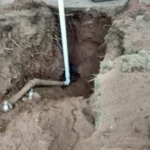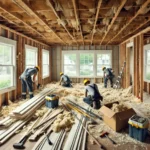Are you a homeowner in New Jersey considering a residential demolition project? Demolishing all or part of a home is a major undertaking that requires careful planning and preparation. This guide will provide tips on getting ready for demolition, choosing the right equipment and contractor, handling permits, disposing of debris, and more:
Evaluating Your Demolition Needs
Before demolition can begin, you need to figure out exactly what parts of your New Jersey home you want to demolish.
Define Your Demolition Project Scope
Do you want to do a full house demolition or a partial demolition focused on certain rooms or sections? Clearly defining the scope early on will help determine equipment needs, costs, permits required, and waste removal plans.
For partial home demolitions, consider which areas connect to others structurally. It may be necessary to demolish a whole connected section rather than just one part of it.
Inspect for Hazardous Materials
Hire an environmental firm to test for asbestos, lead paints, and other hazardous materials. It’s illegal to demolish or renovate areas with these present because exposure poses health risks. Remediation or abatement is required before demolition proceeds.
Planning Your Residential Demolition Project
Proper planning is crucial for safe, efficient, and cost-effective home demolition. Rushing into demolition without preparations in place can lead to injuries, unplanned costs, permit issues, and frustration.
Choose the Demolition Approach
Depending on your DIY skills and willingness to rent equipment, you might decide to take on minor demolitions yourself. But full home demolitions normally require heavy machinery and operator experience best left to professionals. Hire a licensed demolition contractor for large jobs.
Obtain Permits
Check with your New Jersey township office about which demolition permits are required. Common permits cover the demolition itself, waste dumping, asbestos abatement, sewer/water capping, environmental protections, and post-demolition plans.
Schedule Utility Shutoffs
Shutting off water, electricity, gas, and other utilities is a must before demolition equipment starts tearing into walls and fixtures. Contact each utility service to schedule a shutoff pre-demolition to prevent accidental utility damage and safety issues for workers.
Rent Equipment
For DIY demolitions, you’ll need heavy tools like sledgehammers, pry bars, chainsaws, and more to tear down walls and break apart materials by hand. It’s messy, physically exhausting work. You can rent whatever specialized demolition equipment you lack from a local home improvement store.
Create a Demolition Schedule
If you hire a contractor, they will establish a demolition schedule that sequences the work in a logical order. Home teardown steps flow in this order generally:
- Pre-demo interior soft strip
- Hazardous materials abatement
- Utility disconnects
- Structural demolition top to bottom
- Foundation and subsurface demolition
- Debris removal and site clean-up
Build in some buffer room for unknown issues that could impact work timelines. Demolition often uncovers hidden problems needing remediation before continuing.
Demolition Cost Considerations
Demolition bids should factor in projected labor hours, rental fees for equipment/machinery, landfill costs to dump waste, permits, site protection materials, and final clean-up. Nail down what pricing model the contractor uses upfront before signing an agreement.
Common pricing approaches include:
- Square footage rate
- Flat fee
- Time and materials
- Unit pricing per item removed
Compare multiple demolition bids before selecting a local contractor for the job.
Demolition Equipment for Contractors
Demolition contractors bring an arsenal of heavy machinery to quickly and efficiently raze homes in New Jersey. Common demolition equipment includes:
- Excavators – Hydraulic excavators with shear attachments grasp walls and tear away materials. The arm reach and 360-degree rotation allow for precision work.
- High Reach Equipment – Telescoping boom lifts provide workers access to high areas for dismantling roofs, rafters, and walls with hand tools.
- Loaders & Dump Trucks – Loaders scoop up heavy debris to transfer to trucks for disposal site transport.
For large residential demolition projects involving total home destruction, using the right equipment is critical for safety, minimizing community impact, and completion on schedule.
Additional Useful Demolition Machinery
Beyond the standard demolition fleet, contractors often bring supplementary equipment and tools to residential jobs as well depending on needs:
- Portable generators – Provide job site power for tools and lighting
- Forklifts – Allow crews to safely move heavy debris
- Air compressors – Power pneumatic jackhammers for breaking up foundation and surfaces
- Tree removal equipment – Clear trees before demolition if in the strike zone
Don’t hesitate to ask your contractor questions about their machinery line-up planned for tearing down your home.
Executing Your Demolition Project
Once the prep work and planning concludes, it’s time for demolition day. Here’s what to expect as your home teardown project unfolds:
Site Protection
The demolition crew sets up temporary barriers around the job site to protect landscaping, surrounding yard areas, sidewalks, and neighboring buildings from unintentional damage. Barriers will also reduce dust drift and noise.
Structural Demolition Sequence
The work crew systematically demolishes the home from top down, area by area. They “soft strip” first by removing appliances, fixtures, doors, trim carpentry, and hazardous materials for separate disposal. Next, the tearing down of walls, roofs, floors, and foundations occurs according to standard demolition procedure.
Materials Handling & Removal
Crews fill up dump trucks, dump trailers, and roll-off waste containers with demolition debris as they work. Onsite waste storage receptacles provide debris containment until full and ready for haul-off disposal. Proper materials handling reduces neighborhood impact from blowing dust.
Site Clean-Up & Inspection
Once demolition concludes, the contractor cleans up the remaining debris and does a final property inspection. They check for any foundation or subsurface hiding spots needing backfill work before the next construction phase.
Remediation & Grading
If any environmental remediation proves necessary, such as oil tank removal or soil exchanges, the contractor will handle it before grading the site. Grading recontours the vacant property to properly shape drainage patterns and prevent erosion issues.
Questions About Your Upcoming Residential Demolition?
Planning a home demolition project stirs up plenty of questions at each step. For professional guidance tailored to your specific residential demolition needs in New Jersey, contact Bella Demolition and Contracting Services today. Its team handles full and partial home demolition in New Jersey. Get in touch for a competitive, upfront quote, including equipment, labor, and waste disposal. Leave the heavy work to the Bella Demolition and Contracting Services experts!



